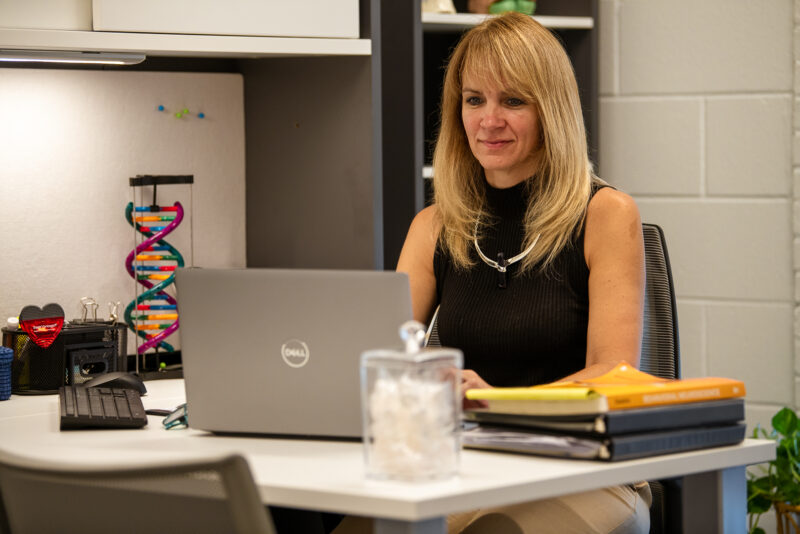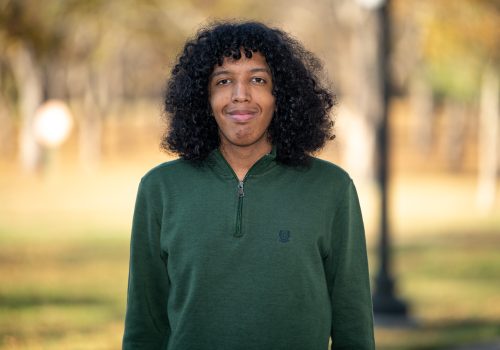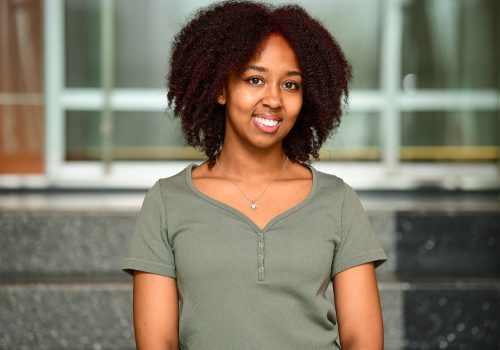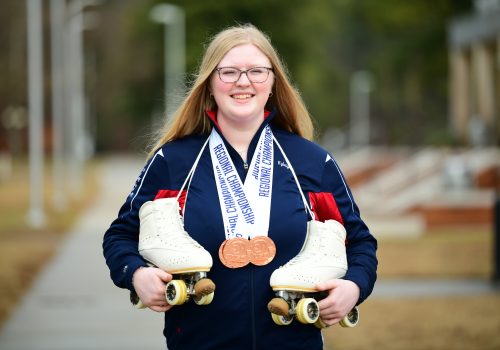Jennifer Van Schoick, Ph.D.: An Astute Researcher of the Mind

An accomplished scientist with a heart for vulnerable minds.
By Sterling Giles
Over the last few years, Richard Bland College of William & Mary (RBC) has leaned in to becoming a beacon for STEM-H (Science, Technology, Engineering, Math and Health Sciences) innovation. A testament to this is the college’s aptly named Academic Innovation Center (AIC) set to open this fall.
Over the last several months, RBC sought out premier talent across the Commonwealth to lead programs and coursework at the center. Psychology researcher Jennifer Van Schoick, Ph.D. was one that rose to the top.
“Her research complements what we’re doing at the AIC,” said Dr. Kimberly Boyd, Principal Investigator, Vice President and Chief Research & Innovation Officer at RBC. “She fits a missing piece to our pie not only from a physiological standpoint, but also from a team and engagement standpoint.
“She’s very personable, she’s very thoughtful and I just think she’s going to be an excellent fit for Richard Bland College.”
Van Schoick, whose official title at the college is Research Psychologist, will teach and conduct research revolving around behavioral science, physiological psychology and psychodrama. She is ecstatic about the learning and research that will take place in the AIC and beyond.
“I would love to get a handful of students that would like to be mentored and that would like to have experience in the lab working with EEG (electroencephalogram), with physiological data [and] mixed method studies,” she said.
Van Schoick will be introducing her first course, Behavioral Neuroscience, this fall. Students will study brain anatomy and plasticity, as well as learn research methodologies.
Van Schoick’s upbringing played a large part in her pursuing her field of study. Her family—plagued by substance abuse, addiction and mental health disorders—inspired her to study the mind. Over the course of her decades-long career, she’s learned in recovery journeys “it comes back to wellness, wholeness and holistic approaches.”
Van Schoick and Boyd previously crossed paths at both Virginia State University (VSU) and Hampton University. As her doctoral professor at VSU, Boyd guided Van Schoick and her classmates on community health campaigns addressing various issues such as mental and sexual health, as well as addiction. Van Schoick’s specific focus was addiction and trauma interventions. Also during her time at VSU, Van Schoick served as a Physiological Psychology instructor and received her Ph.D. in Health Psychology.
At Hampton, Boyd hired Van Schoick to come on as Assistant Professor of Physiological Psychology. Namely, she implemented psychodrama workshops—a form of psychotherapy in which participants act out events from their past—in her teaching. It was a hit amongst her students.
“It’s where theater meets therapy,” Van Schoick said. “There’s no right or wrong—it’s their story.
“It doesn’t leave out their spiritual beliefs, it doesn’t leave out their experience, skin color or culture.”
Van Schoick understands the importance of diverse representation in her research processes. Several years ago, she conducted a study on the victims of intimate partner violence (IPV). The participants were African-American and white women.
She enlisted her colleague, Courtney Leeks, an African-American woman and licensed therapist, to undergo the study with her. Van Schoick anticipated the conversations would differ amongst the study groups, but she was floored by the learnings she and Leeks received.
“Many women faced substantial challenges in accessing safe assistance for both IPV and addiction,” Van Schoick said. “Particularly troubling were the additional barriers encountered by African American women, who often experienced discrimination and abuse within supposed safe havens.”
Despite the harsh reality many of these women faced, the duo reaped the benefits of fostering a safe space for honest conversation to later develop sustainable, holistic solutions. Van Schoick and Leeks identified protective factors within the community that could help the women, such as trained spiritual leaders and support programs.
The culmination of these experiences, research and workshops, has equipped Van Schoick to serve RBC’s and the Greater Petersburg Region’s unique populations. Cultural sensitivity and inclusion are always at the forefront of Van Schoick’s mind, especially with her research.
She is excited about the potential of the AIC, but she’s even more excited about the students she will be working with.
“I think at the heart of it for me is to make connections with students,” she said. “They are the key to the future.”
For more information on the AIC and the Office Of Research & Innovation at RBC, click here.


